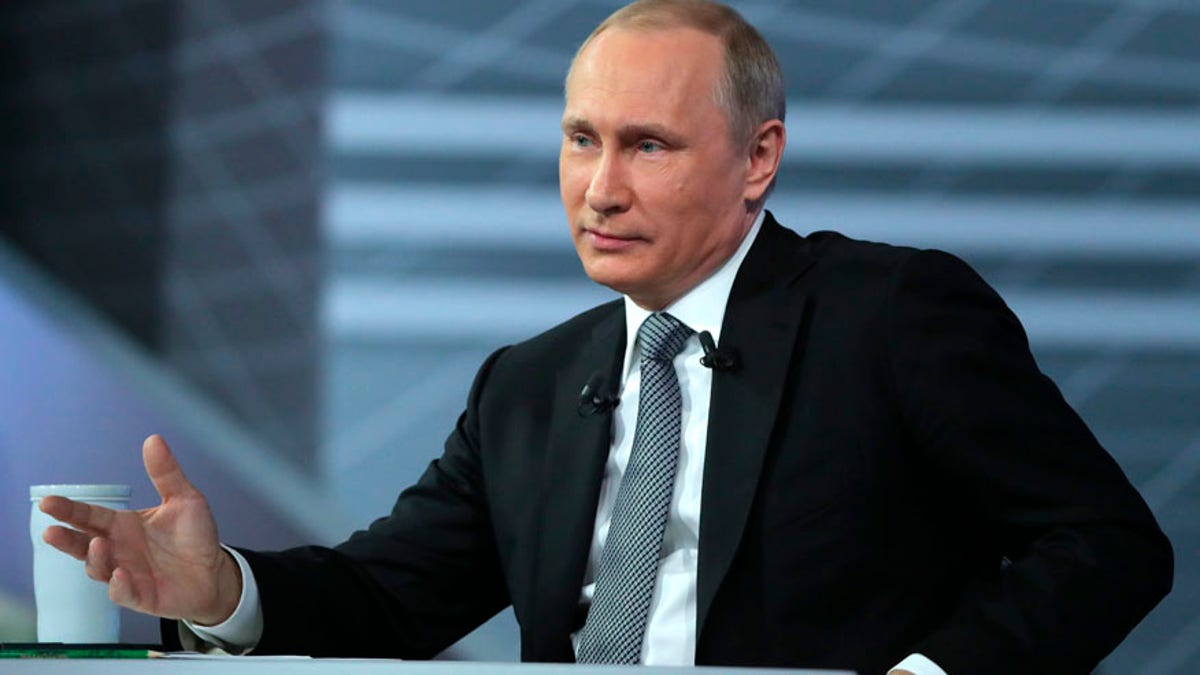
Russian President Vladimir Putin gestures while speaking during his annual call-in show in Moscow, Russia, Thursday, April 14, 2016. The Kremlin has been sifting through more than 1 million questions from across the country to get Putin ready for the television marathon. (Mikhail Klimentyev/Sputnik, Kremlin Pool Photo via AP)
With the final stretch of the presidential elections upon us, Russia’s challenge in Syria is a centerpiece of the foreign policy debate. The candidates need to formulate a clear vision of how to deal with Moscow.
President Vladimir Putin has played a weak hand impressively. The Russian economy is only 8 percent of the U.S. GDP; crucial components of its high tech military are imported; and Russia has not projected power abroad since its withdrawal from Afghanistan, Cuba and Vietnam at the end of the Cold War.
Nevertheless, today Russia is giving the U.S. a run for its money: cyberattacks against the DNC; WikiLeaks interventions in the U.S. election campaign that rival Watergate; and the abrogation of crucial treaties, such as Conventional Forces in Europe.
We are witnessing the dismantlement of the very foundations of US-Russian relations that were laid down during the Soviet era, including arms control and nuclear non-proliferation — the recent plutonium recycling treaty being the latest victim.
Clinton and Trump both need to understand that what we are seeing in Russia now is not just anti-Americanism, but an attempt to turn back 300 years of Westernization, which started under Peter the Great, and continued even under communism.
Russia shot its way into Syria like a cowboy in a bar from a Western movie. Now it is deploying bombers in Iran and demanding that the Gulf states cut oil production – to fill its coffers.
U.S. presidential candidates need to understand the challenge. This is an imperial people – and elite – with an inferiority complex, a long list of bitter yet often imaginary complaints, and a vast nuclear arsenal. Call it “imperial phantom pains.”
This dangerous condition did not start under the Obama administration. Putin’s 2007 Munich speech succinctly spelled out the beef.
The 2008 Georgian war provided a preview of what was coming: the use of force to stop NATO expansion and punish American allies. Then came the “Medvedev Doctrine”: protection of co-ethnics (Russian-speakers) wherever Moscow perceives they may be threatened.
In 2014 that doctrine bore poisoned fruit in Eastern Ukraine, while Crimea was occupied and annexed outright.
Russia is destroying the security system in Europe that resulted from the U.S. and Soviet victory in World War Two. The borders of Europe were codified in the 1975 Helsinki Accords.
These are no longer sacrosanct. Russia wants to act outside of the accepted international legal framework. Yet, the challenge to the U.S. is not just geopolitical. It is also ideological.
After communism, the darkest wing of the Russian Orthodox Church gained increasing influence and began to articulate a shrill anti-Catholic and anti-Protestant agenda. Russia is one of the few countries that has refused to welcome the pope.
Meanwhile, the ghosts of two murderous tyrants, Joseph Stalin and Ivan the Terrible, are being called back in today’s Russia, championed by the Ministers of Culture and Education. Stalin, exposed for his mass murder of over 20 million people, is now hailed with portraits and monuments. The Molotov-Ribbentrop Pact, formerly denounced by Russia, has now been exonerated.
In a macabre twist, the mass murderer and sadist, Ivan IV “the Terrible”, is now being feted with monuments.
Ivan, a sixteenth century vampire of a czar, murdered his son, his wife, and his grandson. He conquered three democratic Russian city states, and piled bodies high enough to block the river Volkhov. He slaughtered the Tatars in Kazan, their capital, and the streets ran with blood.
He later launched a failed war with Poland and Sweden, bankrupting the treasury, and depopulating his own realm. The results of his rule were civil war, a Polish invasion, and the end of his dynasty.
Most importantly for Ivan the Terrible’s fans, he pioneered the rule of terror by secret police, the oprichnina, something that Stalin later emulated. The revival of these dictators bodes ill for the Russians, where internal crackdowns always go hand in hand with foreign adventures.
Clinton and Trump need to understand that what we are seeing in Russia now is not just anti-Americanism, but an attempt to turn back 300 years of Westernization, which started under Peter the Great, and continued even under communism.
To confront a resurgent Russia, the next president needs to prevent Moscow from gaining a victory in Syria.
The U.S. needs to clarify that cooperation in Syria means fighting ISIS and Al Nusra – not saving Bashar Assad. A long term Russian presence in Syria is enabling Iran and is destabilizing for America’s Sunni Arab allies and Israel.
The U.S. should work with Germany toward expanding sanctions on the Russian military industrial complex, including exports of dual use Western technologies to Russia; encouraging increased German military expenditures and an enlarged NATO role; and stopping the gas-exporting Nordstream 2 pipeline.
The next president should ensure that Russia reverses its global challenge against the U.S. and the West. Moscow should fully implement the Minsk 2 Ukraine agreement, stop its military build-up, and fully cooperate in Syria.
Only then can the sanctions on Russia come off and relations improve -- to the benefit of both sides.




















